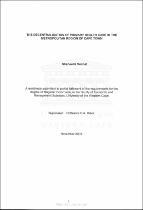| dc.contributor.advisor | Shaheeda Sechel | |
| dc.contributor.author | Black, P.A. | |
| dc.date.accessioned | 2023-03-13T07:59:31Z | |
| dc.date.available | 2023-03-13T07:59:31Z | |
| dc.date.issued | 2002 | |
| dc.identifier.uri | http://hdl.handle.net/11394/9747 | |
| dc.description | Magister Commercii - MCom | en_US |
| dc.description.abstract | In the interest of holistic integrated management, all functions and resources of primary health care should be transferred to the local authority through the process of decentralisation. Thereby placing all such services under a single authority. The reallocation of resources to local authority alternatives can reduce the cost of providing primary health care services. Such reduction does not necessarily imply
budgetary savings; rather, it may imply increasing the number of people who are served or improving the quality of services for a given level of expenditure. The motive for decentralisation, if any, emerges from the majoritarian nature of the political process, efficiency and equity considerations. | en_US |
| dc.language.iso | en | en_US |
| dc.publisher | University of the Western Cape | en_US |
| dc.subject | Primary health care | en_US |
| dc.subject | Metropolitan Area | en_US |
| dc.subject | Local authority | en_US |
| dc.subject | Decentralisation | en_US |
| dc.subject | Collective needs | en_US |
| dc.subject | Costs | en_US |
| dc.title | The decentralisation of primary health care in the metropolitan region of Cape Town | en_US |
| dc.rights.holder | University of the Western Cape | en_US |

